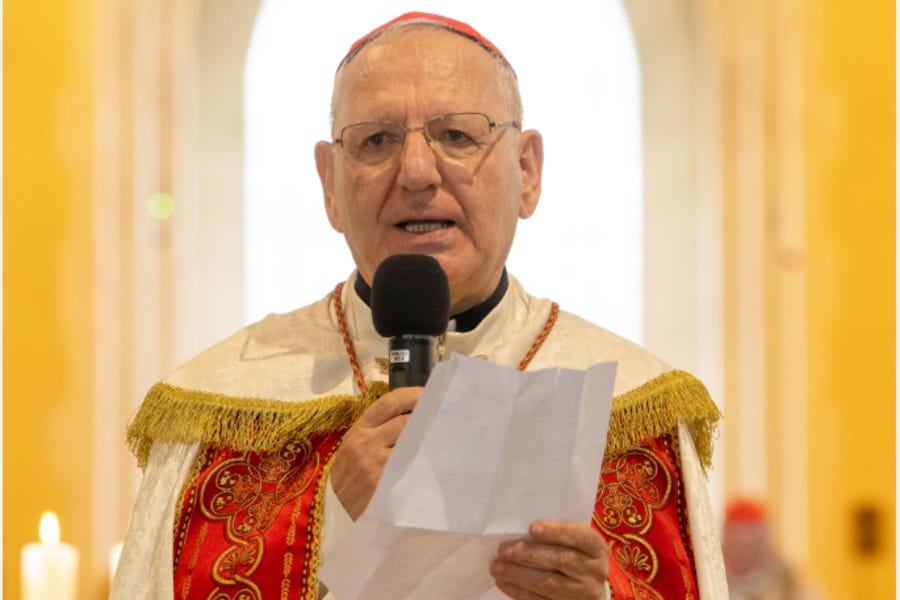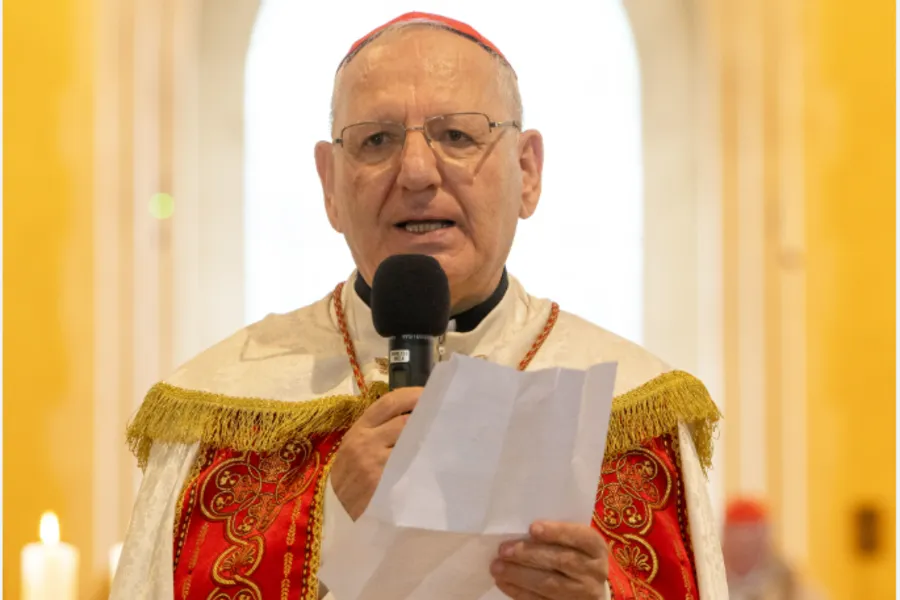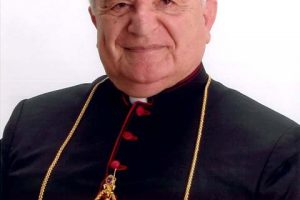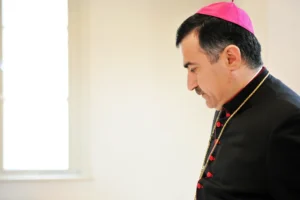The Iraqi political movement has denied any connection with a controversial media interview involving Cardinal Louis Raphaël Sako
An Iraqi political movement denied Tuesday any connection with a controversial media interview in which Cardinal Louis Raphaël Sako appeared to discuss details of the papal conclave.

In a statement sent to The Pillar May 20, the Babylon Parliamentary Bloc called for a “transparent investigation” into the May 9 broadcast by the Arabic-language Charity TV, run by the Congregation of the Maronite Lebanese Missionaries.
Sako, the head of the Chaldean Catholic Church, one of the 23 Eastern Catholic Churches in full communion with Rome, told The Pillar May 14 that Iraq’s Babylon militia had published false information concerning his remarks about the conclave.
The Babylon Parliamentary Bloc emerged from a militia force formed when Iraq was partially occupied by ISIS in 2014. But the bloc rejected suggestions that it retained links to the militia, which it said was integrated into Iraq’s armed forces in 2017, the year ISIS was driven out of Iraqi territory.
The Babylon Movement was founded by Rayan al-Kildani (the Chaldean) and is politically aligned with the country’s Shia Muslim majority. The movement won four out of the five seats reserved for representatives of Iraq’s Christian minority at the last parliamentary election in 2021.
Sako and al-Kildani clashed publicly in 2023, prompting the cardinal to leave Baghdad for nine months of self-imposed exile.
The parliamentary group said: “We question the purpose of implicating our bloc through live broadcast remarks that were viewed by a wide regional audience.”
“If these statements were fabricated, then a transparent investigation should be initiated, holding the channel, its owners (congregation of the Lebanese Maronite Missionaries), and the interviewing priest accountable.”
“However, if the interview was genuine, responsibility lies solely with the one who made the claims. In either case, our bloc remains entirely uninvolved in this matter.”
The bloc added: “We respectfully call upon His Beatitude to present the evidence on which he bases his accusations. We are fully prepared to cooperate with the Church in any transparent inquiry.”
“However, making unfounded accusations undermines reputations and constitutes a deliberate defamation of national figures who operate within the legal framework of their political mandate.”
Cardinal Sako indicated in a May 20 email to The Pillar that he was tired of the debate swirling around the interview, commenting that “the false news never stops.”
Charity TV did not immediately reply to a request for comment.
Controversy erupted in Iraq after the Lebanese broadcaster aired what appeared to be a telephone interview with Cardinal Sako, the sole Middle Eastern Church leader to vote in the May 7-8 conclave.
During the interview, Sako seemed to disclose an apparent procedural irregularity in one round of voting.
“There was a mishap: one of the cardinals placed two ballots into the box. There were 133 cardinals in total — two were absent due to illness — so the total became 134 ballots found,” the 75-year-old cardinal apparently said.
The ballots were seemingly stuck together, Sako appeared to say, recalling that the cardinal who submitted them acknowledged a mistake, with Sako appearing to suggest the accidental ballot had been left blank, and thus did not materially affect the process.
“But no one paid it much attention,” the cardinal appeared to tell the interviewer, before moving on to discuss his past interactions with Leo XIV, and his hopes for the new pope’s approach to Eastern Catholics.
After the interview was aired, both Catholics and non-Catholics in Iraq criticized Sako’s alleged comments on social media, accusing the cardinal of breaching the conclave’s strict confidentiality rules.
Many cardinals discussed the conclave candidly in interviews in the days after the event, but Sako is so far the only one to have faced a wave of public criticism for doing so.
Responding to questions about the interview, Sako told The Pillar by email May 14 that he had not given it at all.
“I had several positive interviews [in Rome], but not in Iraq nor in Arabic,” he wrote.
The cardinal suggested the confusion was caused by the Babylon militia, affiliated with al-Kildani, with whom Sako has publicly feuded for years.
“Babylon militia is since the beginning against me because of my position against corruption, sectarianism, and other things,” the cardinal wrote.
“Therefore it published false information’s about the conclave, which I did not [say],” he added.
“While we reiterate our deep respect for His Beatitude and his esteemed spiritual role as the head of the Chaldean Catholic Church, we believe that these allegations lack accurate factual basis,” it said.
The group noted that both Christians and Muslims in Iraq were proud of the cardinal’s participation in the conclave. Sako was the first Iraqi for centuries to vote in a conclave — a fact celebrated by national media.
The bloc insisted it followed a principle of “non-interference in Church affairs,” and did not wish “to be drawn into a subject that neither concerns us nor falls within our responsibilities.”
It also stressed it was a civil political party operating within Iraq’s democratic structures, and did not possess “any armed wing or militia, contrary to what some narratives suggest.”
It said: “While it is true that ‘Babylon’ originated as a voluntary military force during the war against the terrorist group ISIS — aimed at protecting Christian areas and liberating occupied towns — it was officially integrated into the structure of the Iraqi state in 2017 as part of the 50th Brigade under the command of the Commander-in-Chief of the Armed Forces, namely the Prime Minister.”
“Since then, [the military force] has no longer been known as ‘Babylon,’ and holds no organizational or administrative link to our political movement or parliamentary bloc.”
The U.S. Treasury Department placed Rayan al-Kildani on a sanctions list in 2019, saying he was designated for “being a foreign person who is responsible for or complicit in, or who has directly or indirectly engaged in, serious human rights abuse.”
The Babylon Parliamentary Bloc said it was “committed to serving our Christian community and strengthening their presence through clear development policies involving employment, education, and healthcare.”
“In the past two years alone, over 5,000 Christians have been employed across various government sectors, Christian mayors and district administrators have been appointed in several provinces, and Iraq saw the appointment of its first Christian university president in Hamdaniya just 10 days ago,” it said.
Sako called earlier this year for a change in how Christian representatives are elected to the country’s parliament, ahead of an election scheduled for Nov. 11.
He argued that the current process failed to ensure Iraq’s Christian minority was genuinely represented in parliament.
He proposed restricting voting for the five quota seats to Christians. Currently, all registered voters in a specific region can cast ballots for candidates for reserved seats, regardless of their religion.
Critics have alleged that the Babylon Movement won its four seats in 2021 thanks to support from Shia voters mobilized by the Christian party’s allies in the Shiite Coordination Framework, a coalition of Shia Muslim parties.
But the Babylon Parliamentary Bloc argues it is genuinely representative of Iraq’s Christian community, which has shrunk dramatically since the U.S.-led invasion in 2003 but remains highly diverse.
“Our values are rooted in the teachings of our Lord Jesus Christ, and we strive to translate them into concrete actions that benefit our people,” the bloc said.
“We are not in conflict with His Beatitude the Patriarch. On the contrary, we reaffirm our respect for him and our appreciation for the Chaldean Church. We also take pride in our strong relations with the heads of the 13 recognized Christian denominations in Iraq.”
https://www.pillarcatholic.com/p/babylon-bloc-denies-role-in-iraqi
















Add Comment أضف تعليق